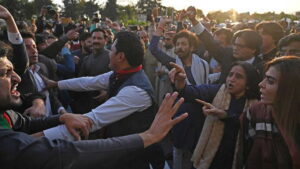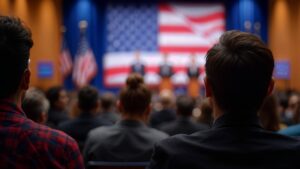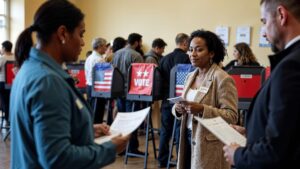Political polarization seems to be present everywhere, whether it is in news reports about protests, discussions on social media, or dinner table debates. People frequently discuss how “divided” politics have gotten in modern society. Political discussions have always been part of life.
However, what is Political polarization exactly? In a few words, it occurs when people’s political views and attitudes diverge so greatly that it seems impossible to find a middle ground. People on opposing political sides grow more unfriendly toward one another before coming to an agreement, which makes it challenging to conduct fruitful discussions or come to agreements.
We can see such instances around us even as these things have become common.
Nonetheless, Political polarization is the widening divide between political views, with fewer people remaining in the center and more people identifying with the far left or the far right. It appears as though everyone has moved to opposing sides of the room, leaving a large vacant area in the center. People or political groups grow more eager in their ideas and less open to hearing or comprehending different points of view in a polarized society.
Political polarization, or the stark difference between opposing political views and beliefs, is a global problem rather than a problem unique to any one nation. Political differences are widening in both established democracies like the US and more recent ones like Brazil and India.
Many question arise like why this occurring on a global scale is and what can we learn from the experiences of other nations?
Just like several questions, there can be several opinions about this matter.
How Do Democracies Get Affected by Political Polarization?

Intense political division weakens democracy in many ways. It is capable of:
- Weakened democratic institutions that are perceived as ineffectual or biased, such as the legislature or the courts
- Cause executive overreach, in which decision-makers abuse their authority to punish opponents and reward allies.
- Pull to pieces the political competition rules like cooperating with the opposition in government or peacefully accepting election outcomes.
Additionally, sometime political polarization impact daily life. According to studies, individuals would probably not want members of their family to get married or even conduct business with someone who supports the opposition. Social interactions become more stressful and polarizing due to this “us versus them” mentality.
Even worse, Political polarization can result in violence. This can be the most horrible outcome of this stance.
What Leads to Political Polarization?

Political polarization can be attributed to many factors. Media and technology are two important factors. As social media and news outlets that support particular political stances have grown in popularity, people frequently receive information that just serves to confirm their own opinions.
This leads to “echo chambers,” where we only hear views that confirm our own, making it more difficult to comprehend or accept different points of view.
The sentimental aspect of politics is another factor. Since many political problems are linked to people’s fundamental beliefs and identities, it is simple for feelings to hijack. Compromise can feel like a loss when politics becomes personal.
Is It Possible to Fix Political Polarization?

It’s extremely difficult to fix a society’s fundamental divisions once they have occurred. When one side does something extreme, the other side reacts, and the cycle continues, usually making matters worse. This is how polarization tends to snowball.
There are strategies to lessen polarization despite these obstacles:
Institutional Reforms: Modifying the Political systems may be beneficial
Legal and Judicial Actions: Courts have intervened in certain nations to defend democratic values
Political Leadership: Effective leadership has the power to change things.
The impact of Political polarization on Society

The consequences of political division on society can be profound. It creates an “us versus them” mentality in which those who hold different political perspectives are viewed as enemies rather than as humans with different viewpoints.
This makes it far more difficult for political parties or organizations to work together, which causes government deadlock and makes it more difficult to legislate lawmaking or resolve significant problems.
Furthermore, Polarization can negatively impact a person’s connections with friends, family, and workplace. It may raise a social atmosphere in which people completely avoid political conversation out of concern about disputes or confrontations. As seen by rallies and political conflicts worldwide, division can occasionally even result in bloodshed or unrest.
Can Political polarization be overcome?
It is possible but extremely challenging to lessen Causes of Political polarization and heal the rift between political parties. One strategy is to encourage more polite and open communication. It can lessen the bad feelings and misconceptions that feed polarization when people with diverse opinions are encouraged to have polite discussions.
Furthermore, Education is also very important. People can spot false information and seek out different points of view by being taught media literacy and critical thinking techniques. Furthermore, initiatives to promote political compromise and strengthen democratic institutions can raise an atmosphere in which various groups cooperate for the benefit of all.
Even those with different Political systems or opinions might feel more united if they concentrate on common values and objectives rather than just differences.
Managing a Polarized World Political polarization is a complicated problem that has an impact on a wide range of societal issues. Finding common ground gets more challenging as people’s ideas become more radical and fragmented, which leads to tension and frustration? However, the first step in resolving Governmental polarization is comprehending its sources and effects.
We can start to close the gap and establish a less divisive and more productive political atmosphere by nurturing open communication, advancing media literacy, and concentrating on common objectives. Although it might not happen right away, initiatives to lessen political polarization might result in a more cooperative, healthy society where compromise is possible and differing opinions are valued.













